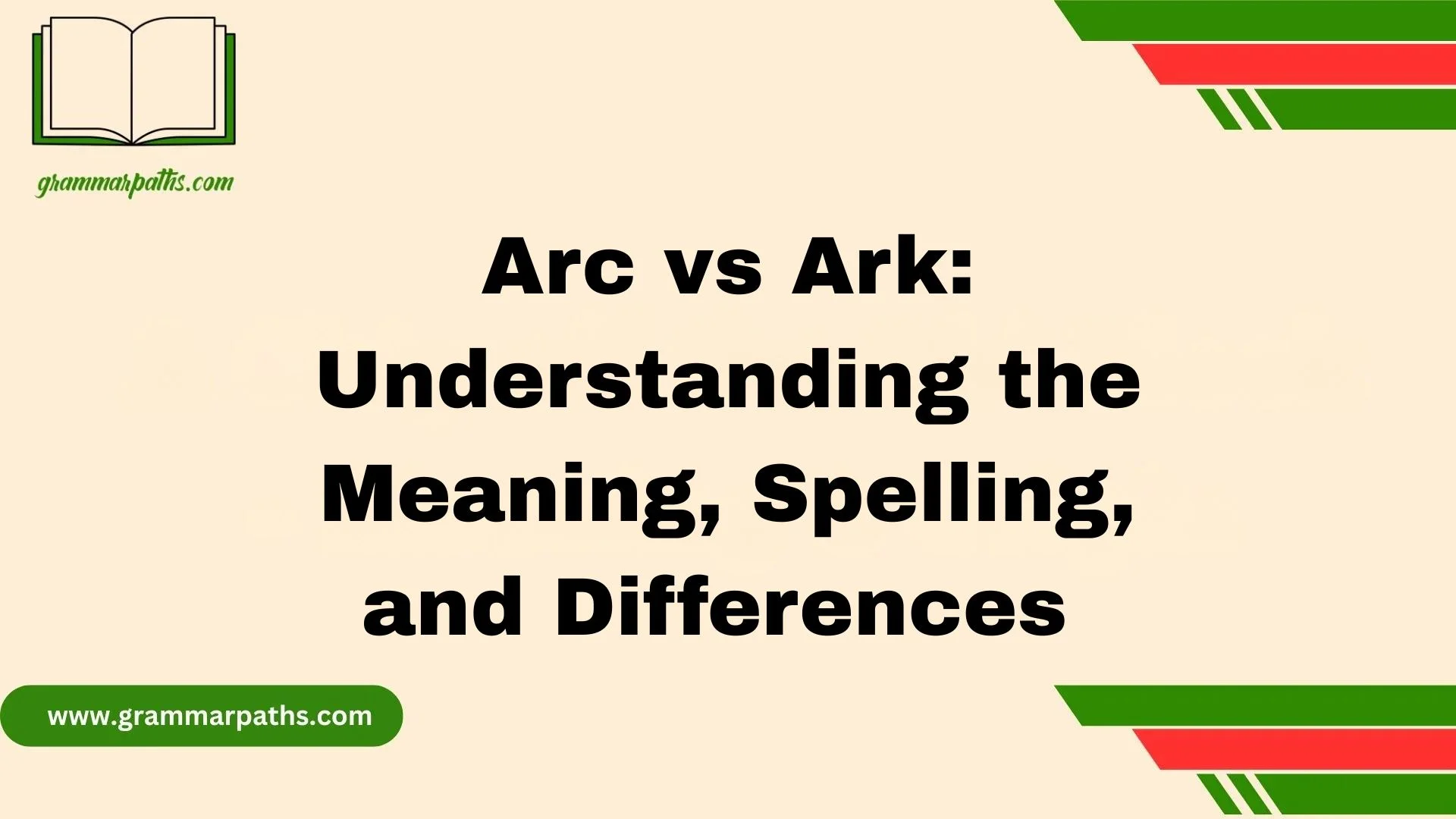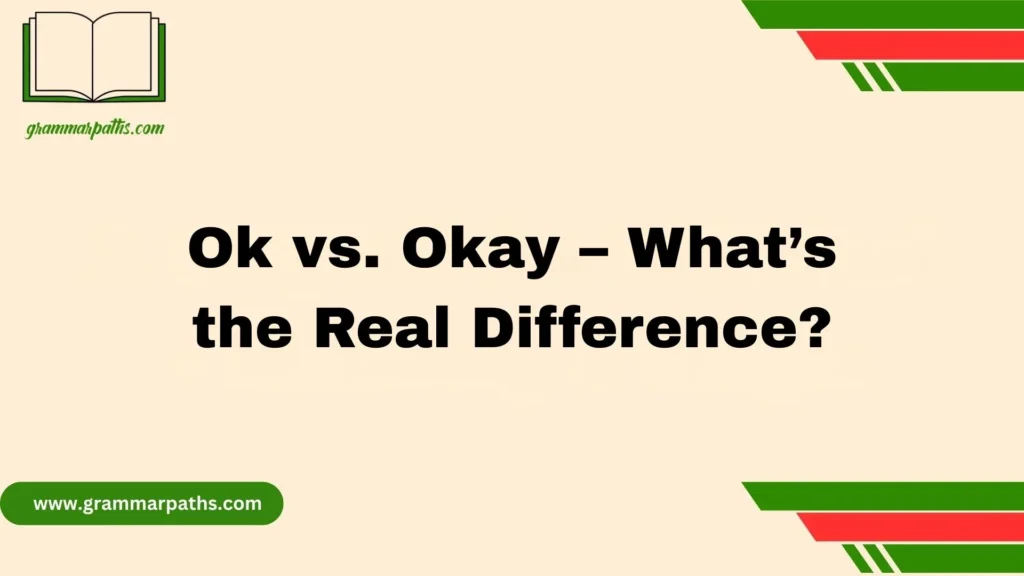The words Arc and Ark might sound similar, but they carry entirely different meanings and uses. Understanding the difference between Arc and Ark helps improve both writing clarity and word choice. The term Arc generally refers to a curved line, shape, or path, often used in geometry, electricity, and storytelling — for example, an arc of a circle or a character arc in a movie. On the other hand, Ark usually represents a sacred chest, vessel, or shelter, most famously known from the Biblical Ark of the Covenant or Noah’s Ark, which carried pairs of animals during the great flood.
While Arc is rooted in Latin arcus, meaning “bow,” Ark comes from the Latin arca, meaning “box” or “chest.” This small variation in spelling changes the entire context of a sentence. For instance, “the arc of lightning lit up the sky” differs entirely from “the ark of Noah saved all species.”
In short, the Arc vs Ark distinction lies in their meanings—Arc is about shape or motion, whereas Ark is about containment or protection. Knowing how to use both correctly ensures precision and richness in both speech and writing.
What Are Homophones — and Why Do They Matter?
Homophones are words that sound the same but have different meanings and spellings. They’re one of the trickiest aspects of English because context is everything. For example:
- There vs. Their vs. They’re
- To vs. Too vs. Two
- Bear vs. Bare
Each pair sounds identical but carries entirely separate meanings. The same goes for arc and ark — both pronounced as /ɑːrk/* — yet their meanings diverge sharply.
Understanding homophones isn’t just about spelling quizzes; it’s vital for clear communication. A single letter can change a sentence’s meaning. Imagine writing, “Noah built an arc,” when you meant “Noah built an ark.” The first suggests he built a curve, not a ship — quite the biblical typo!
What Does “Arc” Mean?
Definition and Core Meaning
The word arc refers to a curve, part of a circle, or shape that bends gracefully. It’s often used in math, literature, and science. Grammatically, arc can be both a noun (“the arc of the rainbow”) and a verb (“the ball arced through the air”).
Here’s the essence:
- As a noun: it’s a curved line or shape.
- As a verb: it describes movement along a curve.
In storytelling, “arc” symbolizes progression or transformation. You’ll often hear terms like “character arc” or “narrative arc” — both referring to how a character or story develops over time.
Common Uses and Contexts of “Arc”
The word arc appears across several disciplines, each with a unique nuance:
| Field | Meaning of Arc | Example Sentence |
| Geometry | A segment of a circle or curve | “He measured the arc of the circle with precision.” |
| Literature | The progression of a story or character | “Her character arc from shy to confident inspired viewers.” |
| Electricity | A discharge of current across a gap | “The electric arc produced a bright blue flash.” |
| Astronomy | The curved path of a celestial body | “The planet’s arc was visible through the telescope.” |
In short, an arc represents movement, change, or shape — something dynamic, often circular or progressive.
Examples of “Arc” in Sentences
Let’s see arc in different contexts:
- The rainbow formed a perfect arc across the sky.
- The hero’s character arc made the movie unforgettable.
- Sparks flew in a bright arc when the wires touched.
- The sun traced an arc over the horizon throughout the day.
- She watched the gymnast arc gracefully through the air.
Each use demonstrates arc as something curving, bending, or developing — physically or metaphorically.
What Does “Ark” Mean?
Definition and Core Meaning
Unlike arc, the word ark refers to a vessel, chest, or container designed for protection or preservation. It’s most famously associated with Noah’s Ark, the massive ship built to save life during the biblical flood, and the Ark of the Covenant, which held the Ten Commandments.
The term ark is a noun only, never used as a verb. It symbolizes safety, protection, or sacredness.
Common Uses and Contexts of “Ark”
| Context | Meaning of Ark | Example Sentence |
| Religion | A sacred chest or vessel | “The Ark of the Covenant was carried with reverence.” |
| History | Noah’s ship from the Bible | “Noah’s Ark sheltered every animal species.” |
| Literature | Symbol of safety or salvation | “The cave served as their ark from the storm.” |
| Modern culture | Representation of preservation or refuge | “Some call modern wildlife sanctuaries an ark for endangered species.” |
So while an arc curves, an ark carries — it holds and protects.
Examples of “Ark” in Sentences
- According to the Bible, Noah built an ark to survive the flood.
- The Ark of the Covenant symbolized divine presence and protection.
- The spaceship in the movie was called “The Ark” — humanity’s last refuge.
- The scientist referred to her cryogenic vault as a modern ark for DNA.
- The ancient temple stored relics in a golden ark.
Each example emphasizes containment, safety, or sacredness — the defining traits of ark.
Arc vs Ark: Spotting the Differences
Although arc and ark sound the same, their meanings, origins, and uses are completely distinct. Here’s a detailed comparison:
| Feature | Arc | Ark |
| Part of Speech | Noun, Verb | Noun |
| Meaning | Curve, path, or storyline | Vessel or container for preservation |
| Common Uses | Geometry, storytelling, electricity | Religion, history, metaphors for safety |
| Symbolism | Movement, change, development | Protection, salvation, faith |
| Origin | Latin arcus (bow, curve) | Hebrew tebah (chest, box) |
| Pronunciation | /ɑːrk/ | /ɑːrk/ |
Quick Memory Trick
- Arc has a C — think curve or circle.
- Ark has a K — think keep safe or kit.
Usage Example
“The lightning’s arc struck the old ark-shaped museum display.”
Here, both words appear together but convey totally different ideas.
Etymology and Historical Origins
Words carry history, and arc and ark trace back to different linguistic roots — despite their modern homophonic sound.
Origin of “Arc”
- Derived from the Latin word “arcus,” meaning bow or curve.
- Entered Old French as arc and Middle English in the 13th century.
- Related terms: arch, arcade, arcuate, and archery (all linked to curves or bows).
Origin of “Ark”
- Comes from the Hebrew word “tebah,” meaning box, chest, or vessel.
- Adopted into Latin as “arca,” meaning chest or container, and into Old English as arc or arche.
- Over time, ark became specifically associated with religious or protective vessels.
So, while they share a faint phonetic overlap, arc evolved from ideas of shape and motion, while ark evolved from protection and storage.
Common Mistakes and How to Avoid Them
Even advanced English learners mix up arc and ark, especially in writing. Here are a few tips to keep them straight:
1. Focus on the Meaning
If it’s about shape, motion, or development, use arc.
If it’s about storage, protection, or safety, use ark.
2. Visual Memory Trick
- Imagine an arc as a rainbow — smooth, curved, colorful.
- Imagine an ark as a ship — sturdy, safe, protective.
3. Mnemonic Devices
- “Arc is curved.”
- “Ark keeps things safe.”
4. Check Context Clues
If the sentence involves geometry, electricity, or storytelling, go with arc.
If it involves religion, history, or protection, go with ark.
Practical Applications and Modern References
Both words live on in modern language, science, and culture. Let’s look at where you might encounter them today.
Arc in Modern Use
- Storytelling: Every good movie has a character arc — the growth a character experiences.
- Technology: Electric arc welding uses a discharge of current to fuse metals.
- Architecture: The arcade in a mall takes its name from the graceful arches forming its design.
- Gaming: Terms like “story arc” and “quest arc” describe plot progression.
Ark in Modern Use
- Pop Culture: Films like Evan Almighty and Indiana Jones and the Raiders of the Lost Ark draw on the biblical ark theme.
- Science: The “Frozen Ark Project” aims to preserve DNA from endangered species — literally a modern ark of life.
- Symbolism: In literature, an ark represents protection or salvation in times of chaos.
Both words continue to evolve, but their symbolic meanings — arc as change, ark as preservation — remain powerful.
Quick Quiz: Test Your Understanding
Choose the correct word — arc or ark — in each sentence.
| Sentence | Correct Answer |
| The rainbow formed a bright ______ across the sky. | Arc |
| The ancient priests guarded the sacred ______. | Ark |
| The movie’s emotional ______ made audiences cry. | Arc |
| Noah built an enormous ______ to survive the flood. | Ark |
| The electricity jumped in a blue ______ between the wires. | Arc |
How’d you do? If you got them all right, you’re mastering the difference between these two tricky homophones.
Case Study: Arc and Ark in Literature and Culture
Let’s explore two famous examples that highlight how arc and ark shape storytelling.
Case 1: The Hero’s Arc
In modern film and literature, the hero’s arc refers to a character’s emotional journey — from weakness to strength, from ignorance to understanding.
Take Iron Man, for example. Tony Stark begins as a self-absorbed genius, but his character arc transforms him into a selfless hero. This arc isn’t a physical curve — it’s a narrative one, representing growth and evolution.
Case 2: The Ark as Salvation
Contrast that with Noah’s Ark, one of history’s most famous symbols of salvation. The ark didn’t change — it protected. It preserved life through destruction. In literature, “ark” often stands for refuge, moral duty, or faith in the face of catastrophe.
Both words represent journeys — one emotional (arc), the other physical (ark). Together, they illustrate how English ties sound to meaning in fascinating ways.
Conclusion:
Though Arc and Ark sound alike, their meanings couldn’t be more distinct. Arc deals with curves, movement, or flow, whether in geometry, electricity, or storytelling. Ark, however, represents protection, safekeeping, or divine preservation, like Noah’s Ark or the Ark of the Covenant.
Understanding the difference between Arc and Ark not only sharpens your language skills but also prevents common spelling and context mistakes. Think of Arc as a curve or connection, and Ark as a container or refuge. Once you grasp that difference, you’ll never confuse them again — and your writing will sound much more accurate and polished.
FAQs
1. What does “Arc” mean?
Arc refers to a curved shape, path, or storyline — such as a rainbow’s arc, an electric arc, or a character arc in literature.
2. What does “Ark” mean?
Ark signifies a container, vessel, or place of safety, like Noah’s Ark or the Ark of the Covenant in religious texts.
3. Are “Arc” and “Ark” pronounced the same?
Yes, they sound the same in most English accents, making them homophones — words that sound alike but differ in meaning and spelling.
4. How can I remember the difference between Arc and Ark?
Think of “Arc” as a curve (both have the letter “C”), and “Ark” as a kind of box (both have the letter “K”).
5. Can “Arc” and “Ark” ever be used interchangeably?
No. Their meanings are completely different — using one instead of the other changes the entire sentence context.

Emma Brooke is a passionate language expert and contributor at GrammarPaths.com, where she helps learners navigate the complexities of English grammar, idioms, and effective writing. With a strong academic background and years of teaching experience, Emma excels at turning tricky grammar rules into simple, practical lessons that readers can easily grasp.












